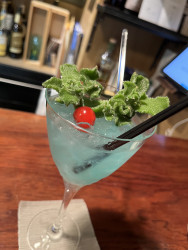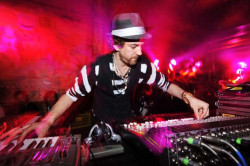
March 23, 2020
Walking Like We Do
The Big Moon on their new album and pretending to be Zayn Malik
By Jessie Carbutt and Takahiro Kanazawa
Walking Like We Do is a real cocktail of an album. A far cry from its grunge-infused, guitar-heavy beginnings, not many would have guessed that The Big Moon’s latest work would instead feature flute solos, piano and shameless doses of 90s pop. The London-based members already bagged themselves a Mercury nomination back in 2017 for their debut album, Love in the 4th Dimension, but this time around lead vocalist and songwriter Juliette Jackson made it a personal challenge to push both herself and the band’s potential even further.
From pretending to be a member of One Direction to dancing like the Backstreet Boys, Jackson shares the story of how the album came together and how the group leapt out of their Brit-pop comfort zone.
Metropolis: Your new album Walking Like We Do is so diverse in its genres and style compared to your first album, which was more classic indie rock, grunge-esque and quite guitar-heavy. What was the inspiration behind that shift and the process of expanding your sound?
Juliette Jackson: I think for us it just felt completely natural. We already made a rock album. We know how to do that. We could easily make another album like that. I used to always just do a big guitar solo alone in the middle of songs and that was where my instinct was, but I knew I wanted to make something different and I knew I could say more with my lyrics. So I tried to challenge myself. I ended up using a lot of different instruments and piano a lot more.
M: Did you feel out of your comfort zone?
JJ: For sure, but I think that’s why it’s exciting. There was a fear that people would be like: “No, I don’t like this anymore. It’s not grunge anymore!” But everyone’s just really on board with it and I think we picked up some new fans with this, which is cool. We learned from this that The Big Moon is always going to be The Big Moon, whatever genre we play, because it’s my lyrics, our voices and us playing. Knowing that is really comforting.
M: Your lyrics have always had a certain humor threading through them, but they can also touch upon more serious issues of this generation, like in “Take A Piece.” Where did the idea for that song come from?
JJ: That was actually one of the first songs I wrote for the album. I’d just seen this documentary about One Direction, and I was pretending that I was Zayn Malik. I was bowled over by how insane their lives were, with screaming fans everywhere and no ownership over your own body. I just pretended I was Zayn and tried to write a song about the experience of being vulnerable on stage, of completely giving yourself to what you’re doing. He has no idea I did that and I’m sure he really doesn’t care, [laughs] but it was the first thing that I did for the new album that felt really good and it came to me quite quickly. So I knew that way was the right way to go.
M: I also love the music video for that song.
JJ: That was so much fun and one of my most favorite days ever. We got to emulate our heroes. When we were growing up we all loved The Backstreet Boys and Boyzone. It just felt right for “Take a Piece” to embrace that song’s “poppiness” and do dance routines.
M: So you all grew up in the UK and you’re based in London now? The imagery in “Dog Eat Dog” is so relatable image if you grew up there: “’Round here they say it’s dog eat dog but / it’s more like pigeon eat fried chicken on the street.”
JJ: [Laughs] I find it amazing that we have such a global fan base because I worry that my lyrics are really “London.” People in London know what it’s like to see a pigeon eating fried chicken on the pavement, [laughs] but I don’t know if that’s something that everyone else over the world sees too?
M: I think here in Japan it did go over some of my friends’ heads.
JJ: [Laughs] Yes, but I think humor is such a vital part of being a human. It’s like a crutch that you can lean on. I feel like even when we get to the end of the world and everything turns to shit, we’ll still make jokes about it and it’s our way of comforting each other and ourselves, and not taking things too seriously. You can step outside of a situation and see it in another way.

M: Is there any chance you’ll come to Japan soon?
JJ: We don’t have any dates lined up but it’s so high on our list of ambitions. We have Japanese fans that send us messages asking when we’re going to play there. Has Japanese House been to Japan?
M: Yeah, she did. We interviewed her [Amber Bain] last August.
JJ: She’s a good friend of mine. We used to live together. She’s a really nice housemate. We watched a lot of crap TV and she has a really big dog called Calvin, he’s a massive German shepherd.
M: What was it like living with another musician?
JJ: Living with other musicians is definitely nice. It’s nice to be surrounded by people who are going through the same thing because it can be such an isolating process when you write by yourself in your bedroom. It’s good to just go to the kitchen, make a cup of tea and go: “I just can’t find a word that rhymes with…whatever,” and just to have somebody to vent with.
We’d usually spend all day in our bedrooms just working on stuff, but we’d talk about things and she [Bain] showed me a lot. She’s way more into production, producing all her own music, and she knows loads of cool tricks that she showed me on her laptop.
We were also living with Marika Hackman. We went on tour and recorded an album with her. If you play someone else’s songs you learn a lot about how they write and of course it all goes into your inspiration.







